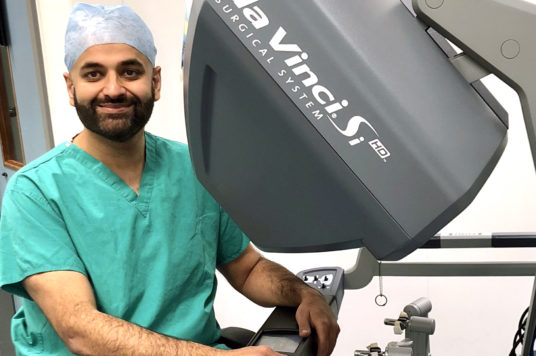St George’s pilots revolutionary prostate cancer service
St George’s is one of three Trusts using cutting edge technology to reduce diagnosis times for prostate cancer from six weeks to one day in a world-leading new approach.
The new method means a ‘one-stop-shop’ for suspected prostate cancer and for men in south west London – where it’s known that men are at a higher risk and often present late with prostate cancer – this new service can revolutionise their care.
Usually when a patient presents with suspected prostate cancer, an MRI scan is followed by a biopsy where around a dozen samples may have to be taken with a needle through the rectum, in order to locate suspect growths on the prostate.
Under the new rapid pathway approach, men have a ‘multi-parametric’ MRI (mpMRI) scan, get their results and can have any necessary biopsy, using new FUSION technology, in one day, rather than multiple outpatient visits over four to six weeks.
Between a third and 40% of patients who have an mpMRI scan will find out on the same day that they do not have prostate cancer and can safely avoid having a biopsy. The machines are also able to pick up growths that are much harder to detect – as small as a grain of rice.
If a biopsy is needed, the new FUSION machines overlay ultrasound images with 3D MRI scans to create a highly detailed map of the prostate that can be used to accurately target suspect areas for taking tissue samples.
St George’s – the only one of the three sites piloting the rapid service – is also able to perform state of the art robotic surgery to treat prostate cancer. This means our patients are able to receive treatment from diagnostics through to surgery, without being referred elsewhere.
Mr Hasan Qazi, Consultant Urological Surgeon and project lead at St George’s, said: “We are very driven to diagnose our patients early and treat them appropriately and effectively.”
“The rapid project for prostate cancer enables men to be diagnosed early, reduces the number of invasive biopsies, which in turn should translate into better outcomes for our patients.”
“We’re really proud to be part of this pilot and it reflects our efforts across the Trust to deliver state of the art diagnostics and treatment for our patients.”
The new approach is being piloted at Queen Mary’s Hospital in Roehampton (part of St George’s), Epsom Hospital and Charing Cross Hospital by RM Partners, the Cancer Alliance for west London.
Prostate cancer is the most common cancer in men in the UK, with over 40,000 new cases diagnosed every year.
The NHS is determined to cut the mortality rate for prostate cancer in the same way that has seen breast cancer rates decline by 10%. As such, NHS England is currently looking into how this approach could be rolled out to other major cancer centres across England.
Photo caption: Mr Hasan Qazi, Consultant Urological Surgeon and project lead at St George’s, with the Da Vinci robot used for robotic surgery.
Notes to editors
For more information, please contact Pippa Harper, Media Manager, on philippa.harper@stgeorges.nhs.uk or 020 8266 6128.



